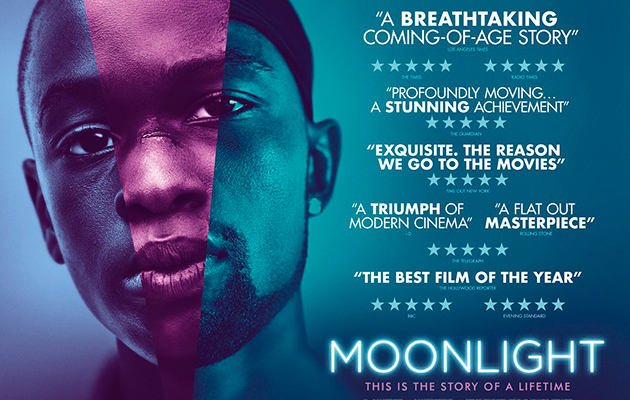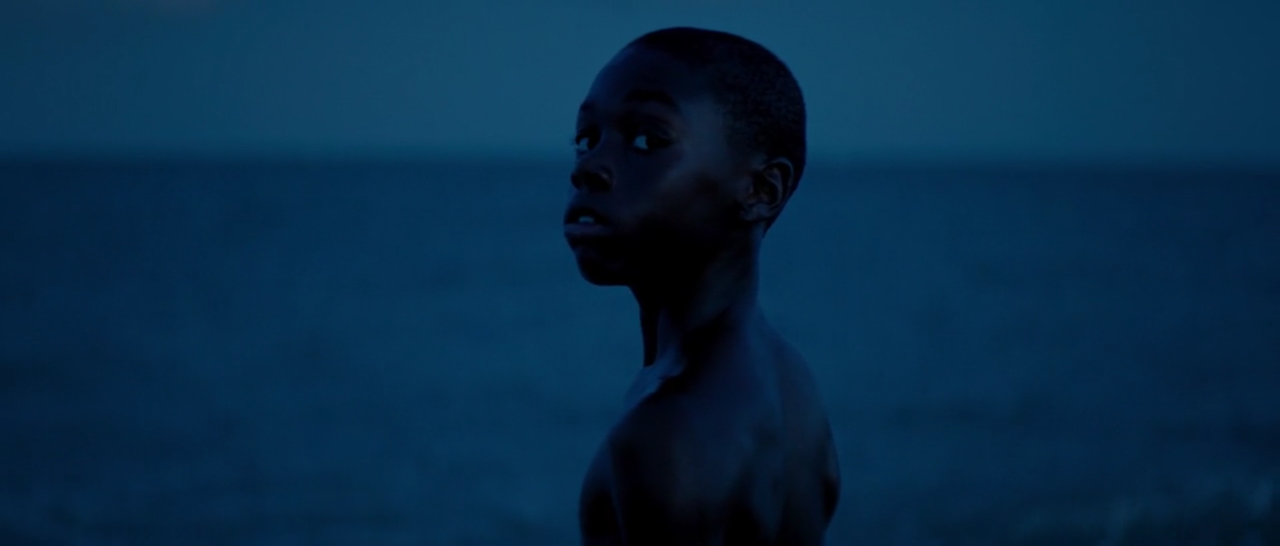Continuing our Film Series based on the WSU Theme: Resilience, we will be showcasing the 2016 Best Picture winning film Moonlight, Tuesday Oct. 9 in Miller Auditorium (Stark 103). The film is rated R, and admission is free and open to the public.
Florida State film school alumnus Barry Jenkins is the creative mind behind the film, co-writing and directing. The film is based off the Tarrell Alvin McCraney semi-autobiographical stage play “In Moonlight Black Boys Look Blue.” McCraney co-wrote the screenplay with Jenkins, and both were distinguished for their work at the 2017 Academy Awards with a win for Best Adapted Screenplay.

The “triptych” story structure is captured in the films poster image
The plot of Moonlight is set in an urban neighborhood in Miami, FL. It follows Chiron in a triptych narrative structure, with three separate acts of the film each focusing on a different stage in his life. The first chapter is titled “Little,” and follows Chiron as a young boy struggling to evade bullies at school and deal with his abusive mother at home. The second chapter is titled “Chiron,” and shows his struggles as a high school student still dealing with his toxic stress at home, and challenges of sexual identity and masculinity both from external and internal forces. The third chapter is titled “Black,” and shows the evolution of Chiron into a young adult who has adapted to his environment physically but still is complicated internally.
The performances from Alex Hibbert (Little), Ashton Sanders (Chiron), and Trevante Rhodes (Black) provide a unique take on the protagonist at different stages in his development, while also providing the appropriate coherence for the overall arc. But these are not the only performances worth commenting on: those from its professional and non-professional actors alike make Moonlight one of the most viscerally acted films of the decade, highlighted by the supporting work of Mahershala Ali, Naomi Harris, Andre Holland, and Janelle Monae.

Moonlight creates some breathtaking images with creative use of light and color
Moonlight is an exceptionally well-crafted film, with a visual aesthetic using a hypnotic camera to draw the audience in and place them in sequences alternating between turmoil and serenity. Cinematographer James Laxton uses color, framing, deep focus, and movement to lead into the film’s editing while working with a precise sound design, which often is character-centric and complementary to the mood of the scene. The musical score by Nicholas Britell offers a musical accompaniment to sway emotion, ranging from old-school R&B to modern hip-hop and classical music “chopped-and-screwed” for impact. Sometimes lost in the kerfuffle over its Academy Award win over La La Land was the fact that Moonlight was as sumptuously shot, effectively edited, and superbly scored a film as any in recent memory.
The film is historically important too. To start with are its Academy Awards: it’s the first film with an all-black cast and the first LGBTQ film to win Best Picture. Ali is the first Muslim to win an acting Oscar and its editor, Joi McMIllon, the first black woman to win an editing Oscar. Following the #OscarSoWhite campaigns, Moonlight’s successes were meaningful ones. In an industry dominated by white males as writers, directors, and stars and where films predominantly feature straight white males as protagonist, Moonlight gives voice to those not frequently represented on screen, and does so with a distinct and compelling cinematic voice.
Barry Jenkins’ Moonlight represents a fantastic feature-film representation of the resilience required to overcome adversity. As you watch, give some thought to the adversity of childhood experiences young Chiron faces, first as “Little” and later as “Black,” and you’ll understand why this film was one of the very first we wanted to select for our series on Resilience. Please join us for this remarkable film.

Trackbacks/Pingbacks